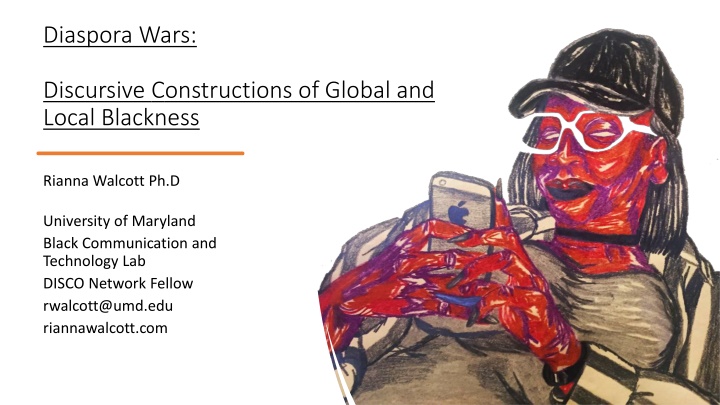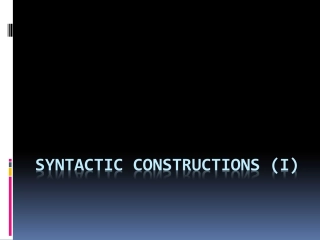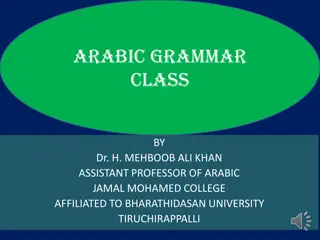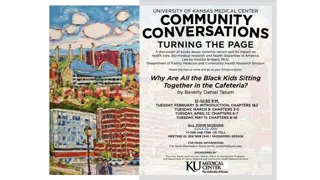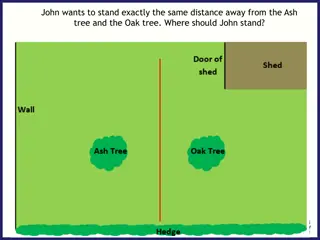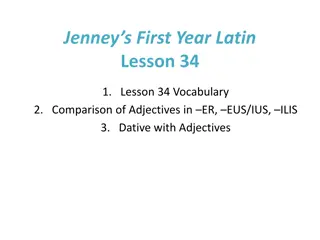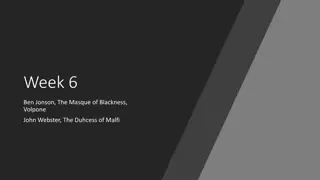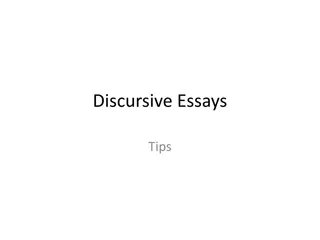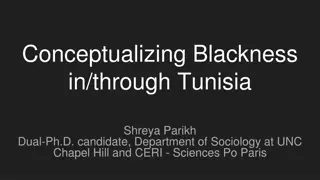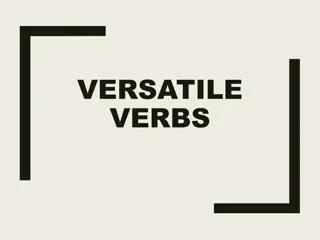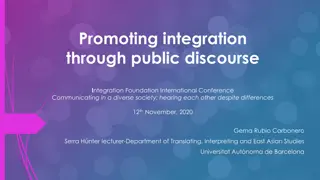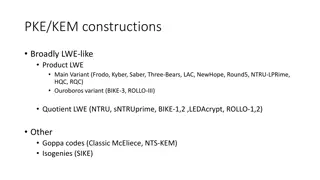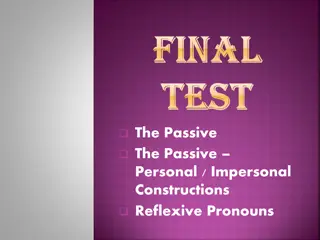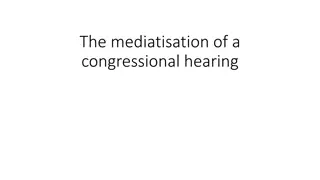Discursive Constructions of Global and Local Blackness
Discussions on the importance of dialogue and connectedness in validating knowledge claims, challenges faced by Black women scholars, and the role of style in constructing identity, with insights on humor as a cultural marker.
Download Presentation

Please find below an Image/Link to download the presentation.
The content on the website is provided AS IS for your information and personal use only. It may not be sold, licensed, or shared on other websites without obtaining consent from the author.If you encounter any issues during the download, it is possible that the publisher has removed the file from their server.
You are allowed to download the files provided on this website for personal or commercial use, subject to the condition that they are used lawfully. All files are the property of their respective owners.
The content on the website is provided AS IS for your information and personal use only. It may not be sold, licensed, or shared on other websites without obtaining consent from the author.
E N D
Presentation Transcript
Diaspora Wars: Discursive Constructions of Global and Local Blackness Rianna Walcott Ph.D University of Maryland Black Communication and Technology Lab DISCO Network Fellow rwalcott@umd.edu riannawalcott.com
For Black women, new knowledge claims are rarely worked out in isolation from other individuals and are usually developed through dialogues with other members of a community. A primary epistemological assumption underlying the use of dialogue in assessing knowledge claims is that connectedness rather than separation is an essential component of the knowledge-validation process (Collins, 1989). Black Feminist epistemologies are opposed to elite white male interests, and may face rejection of our knowledge claims on epistemological grounds ... Black women scholars may know something is true but be unwilling or unable to legitimate our claims using prevailing scholarly norms (Collins, 2009)
Style: Discursively constructing identity Style marks out or indexes a social difference , 'adoptive ways of dressing and behaving [creating an] agentive possibility for social identification creative, performative, reflexive utterances that project personas, identities and genres from well-known identity repertoires (Coupland, 2007) through the relation to the Other, the relation to what it is not, to precisely what it lacks, to what has been called its constitutive outside that the 'positive' meaning of any term - and thus its 'identity - can be constructed (Hall, 1996) Style shifting - An adaptive style where speakers deliberately use different discursive strategies according to different contexts (Wolfram and Schilling, 2015, 282).
Style: Discursively constructing identity Bolu: Our humor uses specific British cultural touchstones that I don't believe white British people use. Describing this is going to sound so strange, but somebody said - I don't know if you saw this tweet yesterday, but it was so funny - um, somebody said, "Oh, if I was still with my boyfriend, it would have been three years - we would have been together three years today." And then somebody quote-tweeted that with - and I don't know if they were Black, but I'm going to say that this is a very Black way of using this meme. Somebody quote-tweeted with a freeze-frame, a screenshot of Gino D'Acampo. Rianna: 'And if my grandmother had wheels, she would have been a bike!' [both laugh]
Language as code There is a certain way of speaking: numerous white girls try to emulate it, and it just doesn't land the same. There is a certain lyricism, there is a certain poetry to how we talk naturally. Whether it's Caribbean heritage, West African heritage, how we merge and meld all these things, and then put it through this funnel of Black Britishness. And then what you get is so unique, that you can t replicate it. We have to really operate under some sort of subterfuge when we're talking about certain things, like sometimes people won't even put the name of the person they're talking about, they'll just be like 'he' and everyone cottons on to what you're talking about. Sometimes there's an understanding that some topics are just too hot for the timeline and that we cannot even broach it because it's going to be pulled out of context. It's almost like a secret code, right? There's nothing written or substantially written that could explain or decode what is going on. There's no way for anyone to be able to Blackfish it. People can Blackfish in terms of imagery, like there's white girls that like to pretend to be mixed race, like to be Black, [and] because of the one drop rule, they could get away with that, aesthetically. But now try to do that in terms of language!
Creating enclaved Black (and feminist) spaces Mutsa: A non-Zimbabwean Black person in Britain tweeted saying you Zimbabweans are annoying because you'll start off your tweets in English, and then you'll finish in Shona, and no one knows the end of the story! It will be like: the problem with men is , and then the rest of it in Shona. Mutsa: As a Zimbabwean, I come from an oral tradition. And the reason why we had an oral tradition was because sound is here in a second, gone in the next; you can cause dissent, you can cause a revolution. I've noticed when I tweet in Shona, it's like an in-joke. And it's that I want specifically Zimbabwean people to understand, and I don't want anyone else to understand it. Like, if I'm, I don't know, cussing out Beyonce or something. That might be a safety, security thing to keep away from the Beyhive. One of my friends was tweeting her Ivy Park thoughts, but she was tweeting them all in Shona. And I was like, I know exactly why you're doing this. Mutsa: Sound helps you resist surveillance. As Black people isn't that all we're trying to do? We re just trying to evade capture, like, I don't want these white people to write that down, [or] see what the hell I'm doing all the time.
Diaspora Wars Mutsa: I like the Black British experience on Twitter, that little enclave is just so wonderful. I just love it so much, whereas sometimes on Clubhouse you'll have a room about Black experiences and people will join not realising that it's about Black British experiences. They'll be like, 'Well, you know, that's not the case in America and America this this this' [ ] that's why we have so many diaspora wars on Clubhouse compared to Twitter. On Twitter, something about the interface makes it easier to differentiate the different diasporic experiences of Blackness. Even the way that we type, our language. J: I mean, before I dive into this, disclaimer, back in my older Black Twitter days, I used to copy a lot of AAVE. So, I was there using the 'y'all', and all of that kind of stuff. And then it began to shift, and you started to see [Black British] people just using the words that we actually use, and the phrases that we use, so a phrase that comes to mind is innit, obviously, innit. R: How they call us the innit innit blacks, right? J: Wow, what else, I think another thing, the British version of 'y'all' is 'you lot'. [ ] Americans are like, 'y'all'. 'Ione like' ... whereas in the UK we're like 'you lot, you man'. And you're not gonna have a diaspora war when someone's saying 'you man' and then they're explaining something that is a uniquely Black British experience. There's no confusion there about what man they're talking about - you man means YOU man! R: Yeah, 'you man' and 'you lot'.
Diaspora Wars Bolu: Our humor is very not to homogenise black people I do believe that there are general ways of communicating, and general beats to our humor, that's kind of almost universal. From a Nigerian perspective, as a Black British person, who has lived among different Black communities, as somebody who grew up on African American pop culture, and has many African American friends, who has dated African American people. I know that that is like, a universal thing, but what's beautiful within our universality is our specificity. It's in our languages and the way that we communicate, and you have Caribbean sensibilities, you have West African sensibilities, you have all these things together. I love it when I see Black British people speaking in cross-cultural ways. I just can see that how they've grown up, we've grown up around so many different Black communities and I think that's what sets us apart. Our humor is just sharp, but a very specific kind of acerbic African Americans have a okay this is gonna be a really weird way to describe it, but makeup right? Foundations, you have a cool undertone, and you have a warm undertone. Americans have a warmer undertone. And we have a cooler undertone. I'm not saying that we're cooler than Americans, I'm not trying to start no diaspora war. But it's just like this, this sharpness to our wit, Americans like things that we, I believe, and I say this very cautiously, would find a little bit corny, you know!
Diaspora Wars: Discursive Constructions of Global and Local Blackness Rianna Walcott Ph.D University of Maryland Black Communication and Technology Lab DISCO Network Fellow rwalcott@umd.edu riannawalcott.com
